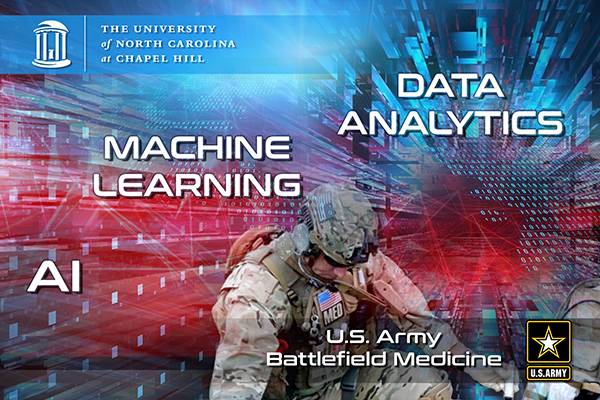
The University of North Carolina will use machine learning and artificial intelligence to help ensure that military health care providers are better prepared to handle the evolving conditions and traumatic injuries seen on the battlefield.
The Department of Defense has awarded a grant of $1.6 million to the UNC Eshelman School of Pharmacy to fund the two-year project. The military has asked the research team for an analytical tool that can evaluate real-world patient data to predict the skills, training and patient care guidelines that military health care workers will need in different scenarios.
The project is being led by Jerry Heneghan, director of the Center for Innovation in Pharmacy Simulation at the pharmacy school, and Robert Hubal, a research associate professor at the school. Heneghan is a West Point graduate and former U.S. Army attack helicopter pilot. Hubal is a cognitive scientist in the center.
“When we analyze health care data and see that Patient A was treated differently than Patient B for the same injury, we want to know why,” Heneghan said. “The tool we are building will analyze large electronic health care trauma databases so that differences in care can be traced back to the kinds of training different military health care workers get to help identify general gaps or deficiencies in clinician knowledge. Once the gaps are identified, they can be addressed.”
The UNC-Chapel Hill team will gather trauma care records from one military and two civilian databases and use AI and machine learning tools to mine the data. They’re looking for relationships that link incomplete treatment or treatment not in line with accepted procedures with provider skill and deviations from established treatment guidelines. The system will though look at the data at an aggregate level, not at individual health care providers. The research team will focus on four leading causes of preventable death on the battlefield: blocked airways and breathing support, bleeding, collapsed lungs and burns.

The research group is calling the system Medical Learning through Machine Learning, or ML2. Ultimately, the system will be able to identify changes in medical threats, review clinical practice guidelines, assess the roles of different health care providers and provide feedback on needed changes to training, Heneghan said.
The system could become a point-of-care decision-making tool based on identifying patterns that show what care has the best statistical outcomes, he said.
The Center for Innovation in Pharmacy Simulation at the UNC Eshelman School of Pharmacy is a unique learning and technology core that drives and supports innovations in pharmacy education and research. CIPS functions across three areas: faculty instructional support, support and development of innovative projects and research support. CIPS develops and delivers unique learning content and assessment models, virtual physiological humans and biomedical performance solutions.
The UNC-Chapel Hill team is partnering with the Carolina Data Warehouse of Health, the Department of Defense Joint Trauma Registry and the North Carolina Trauma Registry to obtain verified trauma data for the project. UNC-Chapel Hill, SAS, Kitware and PiTech will all contribute unique open source tools to validate ML2’s precision and accuracy. This project is funded by the DOD Defense Health Program’s Medical Simulation and Information Sciences Research Program under grant W81XWH-17-R-MSI1.
The investigators on the ML2 project at the UNC Eshelman School of Pharmacy are
- Jerry Heneghan, M.B.A., professor of the practice and principal investigator;
- Robert Hubal, Ph.D., a research associate professor;
- Alexander Tropsha, Ph.D., H. Lee Distinguished Professor and associate dean for pharmacoinformatics and data science;
- Olexandr Isayev, Ph.D., a research assistant professor; and
- Jacqui McLaughlin, Ph.D., an assistant professor and director of the Center for Innovative Pharmacy Education and Research.

